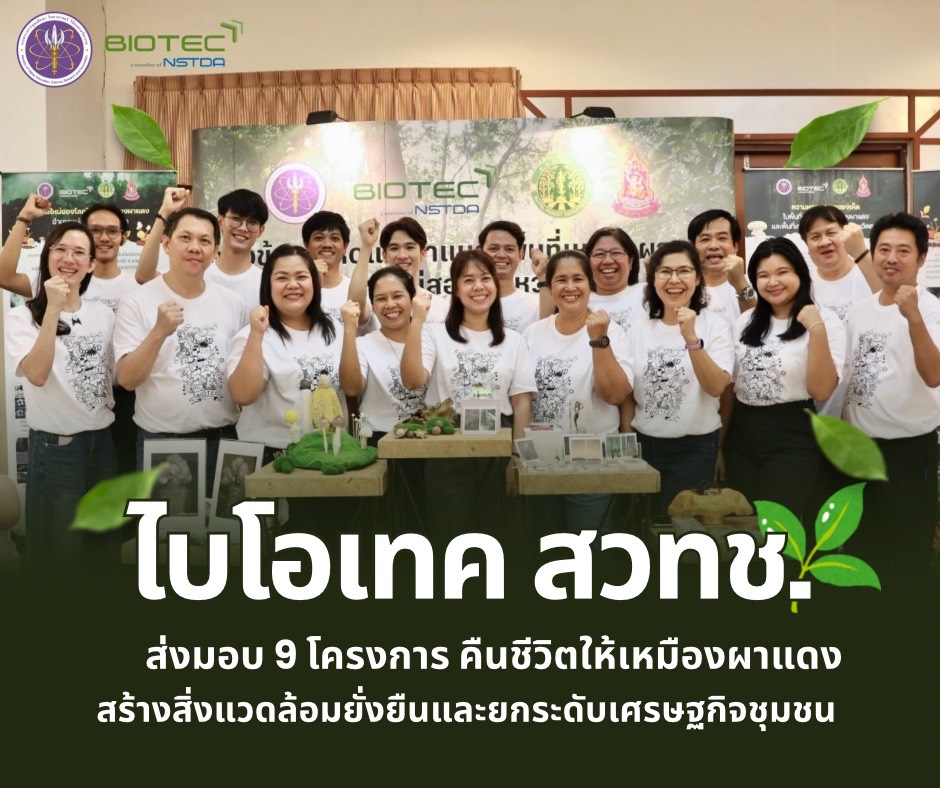The National Center for Genetic Engineering and Biotechnology (BIOTEC), under the National Science and Technology Development Agency (NSTDA), the Ministry of Higher Education Science Research and Innovation (MHESI), in collaboration with the Environmental Conservation and Restoration Learning Promotion Project under the Royal Initiative, Tak (Pha Daeng), with support from the Office of the Royal Development Projects Board (ORDPB), and various network partners, has delivered 9 sub-projects focused on biodiversity restoration and strengthening the grassroots economy in Phadaeng mining area.

These projects are grouped into three main categories: Biodiversity, Product from Agricultural Materials, and Technology Transfer for Communities. The Knowledge and innovations were handed over to the Royal Forest Department and surrounding communities as a mechanism to ensure long-term sustainability in biodiversity, improve community, economic potential, and preserve the environment-ultimately benefiting the people of Tak province in the long run.
Biodiversity Projects
(1) Forest and Medicinal Mushroom Database
(2) Insect-Pathogenic Fungi Database
These projects established critical databases of local microbial biodiversity, including edible and medicinal mushrooms, and fungi that can biologically control insect pests. These databases serve as valuable knowledge repositories and foundational resources for the future sustainable use of biological assets.
Products from Agricultural Materials
(1) Yeast-Fermented Coffee
(2) Coffee Peel Vinegar
(3) Bio-Bricks from Agricultural Waste
These projects applied science and technology to add value to local agricultural produce. For example, yeast-fermented coffee has been developed to give Mae Sot coffee a unique identity. Coffee peels, once discarded as waste, are now transformed into high-value vinegar. Agricultural waste is also used to produce bio-bricks, illustrating the concept of Circular Economy—turning waste into value-added products.
Technology Transfer for Communities
(1) Organic Greenhouse Cherry Tomato Cultivation
(2) Seed Ball Production for Forest Restoration
(3) Economic Mushroom Cultivation with Tree Saplings
(4) Use of Biocontrol Agents in Organic Agriculture
These initiatives ensure that knowledge is not confined to academic circles but is transferred directly to communities for real-world application. For instance, seed ball technology for forest rehabilitation, cultivation of valuable mushrooms like Astraeus hygrometricus and Termitomyces with rubber tree saplings to provide dual benefits of reforestation and income, use of biocontrol agents in organic farming, and greenhouse organic cherry tomato cultivation—all empower communities to become more self-reliant and generate sustainable income through technology.
Throughout the implementation, strong collaboration was received from local networks including the Royal Forest Department, Kamphaeng Phet Rajabhat University, Tak Chamber of Commerce, Tourism Authority of Thailand (Tak Office), as well as community organizations and local citizens—all playing essential roles in transforming Phadang into a sustainable learning hub and income-generating area.
